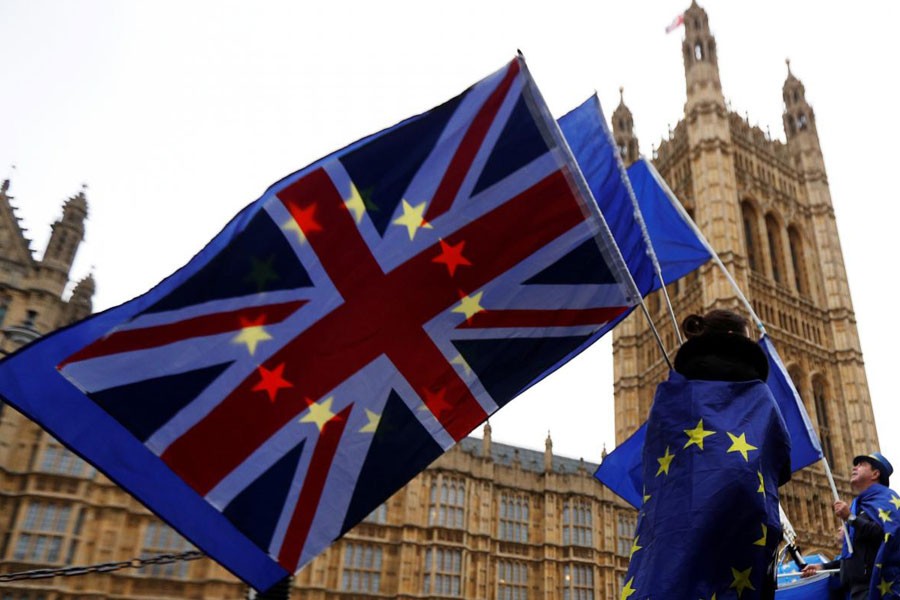
Published :
Updated :

Bangladesh is considering strategies like formation of a joint trade commission to buffer possible post-BREXIT impacts on its trade with the United Kingdom (UK).
Other plans include a feasibility study and initiating a free trade agreement and requesting the UK to continue its committed generalised system of preferences, or GSP, until 2027.
Dhaka may send a demo-official letter to the British secretary of state for international trade assuring its closer trade ties in the post-BREXIT era.
Commerce ministry has devised the strategies in line with the reports of the Bangladesh Foreign Trade Institute and Bangladesh's mission in the UK.
On February 11, British High Commissioner Robert Chatterton Dickson apprised commerce minister Tipu Munshi of a new tariff policy after the UK's divorce from the European Union.
The envoy in a letter sought Dhaka's opinion on new arrangements for a future bilateral trade relationship.
Mr Tipu later asked his ministry's colleagues to convene a stakeholder consultation on this issue.
Besides, the reports recommended that Bangladesh seek the UK's support beyond 2027 for its smooth transition from LDC to a developing country.
Bangladesh Trade and Tariff Commission may be tasked to prepare an in-depth economic impact analysis on BREXIT.
The Bangladesh mission in London may pursue the issues with the UK government, the reports suggested.
Bangladesh may continue to attend trade fairs in Britain, strengthen business-to-business (B2B) contact and engagement, including formation of the Bangladesh-UK Business Forum.
The UK, which left the EU on January 31, is developing a new most favoured nation (MFN) tariff schedule, replacing the regional grouping's common tariff policy.
But the new tariff will not be applicable to goods coming from developing countries like Bangladesh, which are beneficiaries of the GSP.
Under the GSP, Bangladeshi goods continued to enjoy duty-free quota-free market access there.
To simplify its tariff, the UK government is considering removing the 'nuisance tariffs' that are as low as 2.5 per cent or less.
With the removal of lower-band tariff, many goods of developing countries will have to compete with those coming from developed countries as duty rate will be zero in both cases.
Tariffs currently under 20 per cent will be rounded to the nearest 2.5 per cent, meaning the present tariffs of 19.2 per cent will come down to 17.5 per cent and from 12.3 per cent to 10 per cent.
Besides, tariffs currently more than 20 per cent and under 50 per cent will be rounded to the nearest 5.0 per cent.
It means current tariffs of 48 per cent will be lowered to 45 per cent and to 20 per cent from 22 per cent.
Even tariffs equal to and above 50 per cent will be rounded to the nearest 10 per cent, meaning current tariffs of 68 per cent will be 60 per cent.
The UK will also remove tariffs on key raw materials and where it has zero or limited domestic production, thus essentially slashing the import costs.
Britain's new tariff policy could erode the competitive advantage of Bangladesh, a source said.
"Goods of developing countries will face competition in terms of prices as developed nations will enjoy competitive advantage due to the removal of comparatively lower-band tariffs," he told the FE.
"All countries that are current beneficiaries of EU's GSP scheme will continue to enjoy preferential tariffs through our new trade scheme," the letter said.
"You will recognise that tariffs lowered for everyone may expose Bangladesh and other developing countries to more competition on some goods, where they previously had a competitive advantage."
According to Bangladesh Foreign Trade Institute, "The UK is trying to make unique tariff structure in comparison to the EU, thus making it liberal and further opening up its market."
Bangladesh's export is already facing trouble. The new competition will worsen it further, read its documents.
If the British economy shrinks or the government takes a new initiative to hold money within the country, commerce ministry says, the amount of foreign direct investment will also decline.
Bangladeshi immigrants in the UK may send less remittance if the cost of living increases there due to BREXIT, a ministry document discloses.
In fiscal year 2018-19, Bangladesh's export earnings from the UK posted 4.51-per cent growth to $4.16 billion (about 93 per cent of which was garments).
It was 11.76-per cent growth to $3.99 billion in the fiscal year 2017-18, according to the Export Promotion Bureau (EPB) data.
The apparel sector contributes $3.85 billion which is 92.56 per cent of total exports of $4.16 billion.
Centre for Policy Dialogue research director Dr Khondaker Golam Moazzem said, "The UK is trying to make its tariff structure attractive than the EU."
It looks interested to sign bilateral deals with many important economies who are the competitors of Bangladesh, he said.
Bangladesh will face uneven challenges if the UK signs bilateral deals with its trade rivals, he told the FE.
Mr Moazzem suggested taking steps required to get more trade facilities from the UK.
rezamumu@gmail.com


 For all latest news, follow The Financial Express Google News channel.
For all latest news, follow The Financial Express Google News channel.